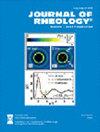Molecular weight effects on the stress-relaxation behavior of soft thermoplastic elastomer by means of temperature scanning stress relaxation (TSSR)
IF 3.2
2区 工程技术
Q2 MECHANICS
引用次数: 4
Abstract
The mechanical properties of multiblock copolymer thermoplastic elastomers (TPEs) are governed by the interplay of different reversible dynamics [e.g., hard block (HB) association and chain entanglements]. Understanding how these physical processes influence the high-temperature deformation behavior is relevant as many TPEs lose toughness with increasing temperature. Increasing molecular weight (Mw) improves their temperature resistance that is attributed to an increase in network connectivity. Indeed, longer chains are characterized by more HBs per chain and by a longer lifetime of the entanglements in the amorphous phase. Both the associating HB and disentanglement dynamics are temperature and rate dependent. To further understand the interconnected role of Mw, temperature and rate dependencies on the mechanical properties, we perform Temperature Scanning Stress Relaxation (TSSR) tests. The method consists of measuring the stress relaxation of the materials as the temperature monotonically increases, allowing us to probe the stress response as the HBs progressively disassociate due to the increase in temperature. The results show that increasing Mw improves the high-temperature relaxation behavior, allowing the material to retain more stress than its low Mw counterpart as the temperature increases. This distinction does not show itself when performing standard small strain dynamic mechanical thermal analyses. Depending on the deformation experienced before the TSSR is performed, different relaxation behaviors are observed illustrating the importance of the current microstructure in determining the mechanical properties. The TSSR approach is well-suited to benchmark the high-temperature stress-bearing properties of network-based polymers whose morphology and, hence, properties are strongly deformation dependent.基于温度扫描应力松弛(TSSR)的分子量对软性热塑性弹性体应力松弛行为的影响
多嵌段共聚物热塑性弹性体(TPEs)的机械性能是由不同可逆动力学的相互作用所控制的[例如,硬嵌段(HB)结合和链缠结]。了解这些物理过程如何影响高温变形行为是相关的,因为许多tpe随着温度的升高而失去韧性。分子量(Mw)的增加提高了它们的耐温性,这是由于网络连通性的增加。事实上,较长的链的特点是每个链上有更多的HBs,并且在非晶相中纠缠的寿命更长。缔合HB和解缠动力学都与温度和速率有关。为了进一步了解Mw、温度和速率对机械性能的相互作用,我们进行了温度扫描应力松弛(TSSR)测试。该方法包括测量温度单调增加时材料的应力松弛,使我们能够探测由于温度升高而使HBs逐渐分离时的应力响应。结果表明,随着温度的升高,增加Mw可以改善材料的高温弛豫行为,使材料比低Mw的材料保留更多的应力。在进行标准的小应变动态机械热分析时,这种区别并不表现出来。根据在TSSR之前经历的变形,观察到不同的弛豫行为,说明了当前微观结构在确定力学性能方面的重要性。TSSR方法非常适合对基于网络的聚合物的高温应力承载性能进行基准测试,这些聚合物的形态和性能强烈依赖于变形。
本文章由计算机程序翻译,如有差异,请以英文原文为准。
求助全文
约1分钟内获得全文
求助全文
来源期刊

Journal of Rheology
物理-力学
CiteScore
6.60
自引率
12.10%
发文量
100
审稿时长
1 months
期刊介绍:
The Journal of Rheology, formerly the Transactions of The Society of Rheology, is published six times per year by The Society of Rheology, a member society of the American Institute of Physics, through AIP Publishing. It provides in-depth interdisciplinary coverage of theoretical and experimental issues drawn from industry and academia. The Journal of Rheology is published for professionals and students in chemistry, physics, engineering, material science, and mathematics.
 求助内容:
求助内容: 应助结果提醒方式:
应助结果提醒方式:


